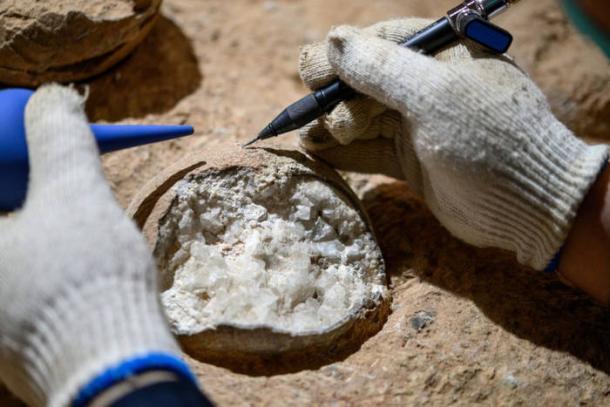Science
Chinese Scientists Date Dinosaur Eggs at 85.91 Million Years

Scientists in China have achieved a significant breakthrough in paleontology by directly dating dinosaur eggs for the first time, determining them to be approximately 85.91 million years old. This pivotal research was conducted on specimens from the Qinglongshan site located in Hubei Province. By employing an innovative “atomic clock” dating technique, researchers aim to enhance our understanding of dinosaur evolution and the climate changes during the Late Cretaceous period.
The dinosaur eggs, attributed to the species Placoolithus tumiaolingensis, were part of a clutch containing 28 eggs. This specific dating method provides unprecedented insights into a critical era when Earth’s climate underwent significant cooling, which may have played a role in the extinction patterns observed among dinosaurs.
Revolutionary Dating Technique
The atomic clock method utilized in this study marks a departure from traditional dating techniques, which often rely on indirect measurements and assumptions. Instead, this approach allows for a more precise determination of the age of fossilized remains. The implications of this research extend beyond mere dating; it offers a deeper understanding of the environmental conditions that influenced the evolution of dinosaurs and their eventual decline.
According to Bi Zhao, a researcher involved in the study published in the journal Frontiers, “This breakthrough allows us to connect the dots between the climatic changes of the Late Cretaceous and the biological responses of dinosaurs. Understanding the age of these eggs helps us reconstruct the ecological dynamics of that time.”
Implications for Paleontology and Climate Studies
The findings from the Qinglongshan site not only contribute to our knowledge of dinosaur life cycles but also shed light on how ancient creatures responded to environmental shifts. The cooling climate of the Late Cretaceous likely created challenges for many species, and the information gleaned from these eggs may provide clues about the survival strategies employed by dinosaurs during this tumultuous period.
As paleontologists continue to explore the implications of this research, they anticipate that the atomic clock dating method could be applied to other fossilized specimens, potentially reshaping the timeline of prehistoric life. The study’s results underscore the importance of integrating advanced technology into the field of paleontology, paving the way for future discoveries that may further illuminate the history of life on Earth.
This breakthrough in dating dinosaur eggs not only enhances our understanding of the past but also emphasizes the need for ongoing research into the factors that shaped the evolution of life during one of Earth’s most dynamic periods.
-

 Top Stories3 days ago
Top Stories3 days agoTributes Surge for 9-Year-Old Leon Briody After Cancer Battle
-

 Entertainment2 months ago
Entertainment2 months agoAimee Osbourne Joins Family for Emotional Tribute to Ozzy
-

 Sports2 days ago
Sports2 days agoConor Murray Reflects on His Career in New Autobiography
-

 Politics2 months ago
Politics2 months agoDanny Healy-Rae Considers Complaint After Altercation with Garda
-

 Top Stories2 days ago
Top Stories2 days agoNewcastle West Woman Patricia Foley Found Safe After Urgent Search
-

 Top Stories1 month ago
Top Stories1 month agoIreland Enjoys Summer Heat as Hurricane Erin Approaches Atlantic
-

 World2 months ago
World2 months agoHawaii Commemorates 80 Years Since Hiroshima Bombing with Ceremony
-

 Top Stories2 months ago
Top Stories2 months agoFianna Fáil TDs Urgently Consider Maire Geoghegan-Quinn for Presidency
-

 World2 months ago
World2 months agoGaza Aid Distribution Tragedy: 20 Killed Amid Ongoing Violence
-

 World2 months ago
World2 months agoCouple Convicted of Murdering Two-Year-Old Grandson in Wales
-

 Top Stories2 months ago
Top Stories2 months agoClashes Erupt Between Far-Right Groups and Migrants in Spain
-

 World2 months ago
World2 months agoAristocrat Constance Marten and Partner Convicted of Infant Murder









